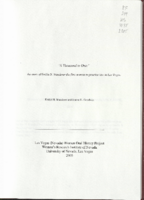Search the Special Collections and Archives Portal
Search Results

Jose Leonardo Martinez oral history interview: transcript
Date
Archival Collection
Description
Oral history interview with Jose Leonardo Martinez conducted by Barbara Tabach and Nathalie Martinez on August 19 and 29, 2020 for the Latinx Voices of Southern Nevada Oral History Project. Session 1: Jose discusses his childhood and what it was like growing up during the Salvadoran Civil War. He recounts the dangers he's faced and how he made his way to the United States after traveling through Guatemala and Mexico. Subjects discussed include: Salvadoran Civil War; Ciudad Arce, El Salvador; Guatemala; Mexico; Los Angeles, California. Session 2: Jose continues his discussion of growing up in El Salvador and the violence he witnessed in the country's army during the 1980s. He also talks about his personal life after moving to the United States and his experiences navigating gang culture in Los Angeles, California. Jose recounts his previous jobs, his schooling, how he met his wife, and his family's move to Las Vegas. Subjects discussed include: El Salvador army; gang violence.
Text

Floyd Jenne interview, April 4, 1976: transcript
Date
Archival Collection
Description
From the Ralph Roske Oral History Project on Early Las Vegas; OH-00944. On April 4, 1976, Gordon Brusso interviewed Floyd L. Jenne (born 1915). The interview discussed Boulder City McGill, as well as Nevada history.
Text

Transcript of interview with Joe Lappin by Gordon Brusso, March 4, 1976
Date
Archival Collection
Description
On March 4, 1976, Gordon Brusso interviewed former miner, Joe Lappin (born November 14th, 1914 in Santa Paula, California) about his life in Boulder City, Nevada. The two discuss his early occupational history and his work for the Bureau of Mines. He then goes on to explain the different housing systems that developed in Boulder City during World War Two.
Text

Transcript of interview with Mary & Bruce Eaton by Beatrice Scheild, March 8, 1975
Date
Archival Collection
Description
On March 8, 1975, Beatrice Scheid interviewed Mary and Bruce Eaton about their lives in Boulder City, Nevada. Mary first talks about her life in the early days of Boulder City, specifically the influences of the churches and schools. She also talks about housing, transportation, and her career as an educator. Bruce (born 1904 in Toronto, Kansas) also talks about his life in Boulder City and his arrival to Southern Nevada as he sought employment in working on the building of Hoover Dam. Bruce talks about his employment with Six Companies, Inc. and discusses topics such as the employment wages, his and Mary’s experiences in building a house, and their experiences in buying a house built by Six Companies. Bruce also talks about the roles of Sims Ely, the city manager of Boulder City, and Frank Crowe, the construction superintendent of Six Companies. Bruce then discusses the issues of worker’s compensation as it related to work on the dam, and he describes, in detail, the cooling system us
Text

Transcript of interview with William E. "Bilbo" Helms by Denise Wolff, March 4, 1980
Date
Archival Collection
Description
On March 4, 1980, collector Denise Wolff interviewed truck driver and teacher, William E. “Bilbo” Helms (born on December 7th, 1932 in Memphis, Tennessee) in an office room at Bonanza High School in Las Vegas, Nevada. This interview covers the transformation, growth, and development of the public education system in Las Vegas, Nevada.
Text

Transcript of interview with Emilie Wanderer by Joanne Goodwin, 2000
Date
Archival Collection
Description
Emilie Wanderer was the first woman to establish a law practice in Las Vegas. She also helped to start a family court in Nevada with a social worker and a marriage counselor on staff. She and her son John were the first mother-son team to practice law in Nevada.
Text

Transcript of interview with Pamela Gale by Margaret Louis, July 10, 1995
Date
Description
Text

Transcript of interview with Flora Hannig-Kellar by Michael Taylor, March 27, 1981
Date
Archival Collection
Description
On March 27th, 1981, collector Michael D. Taylor interviewed housewife Flora Hannig-Kellar (born January 24th, 1902 in Washington, Utah) in Henderson, Nevada. This interview is Flora Hannig-Kellar’s personal account on growing up in Nevada. She discusses home and family life and local social and recreational activities. During the interview Mrs. Hannig-Kellar also shares some of the poetry she wrote about Nevada and her family, specifically her children and grandchildren.
Text

Transcript of interview with Elbert Edwards by Ronald Johns, 1972
Date
Archival Collection
Description
On an unspecified date in 1972, Ronald Johns interviewed Elbert Edwards (born 1907 in Panaca, Nevada) about his life in Southern Nevada. Edwards first talks about his family’s move to Panaca, Nevada in 1864 and talks briefly about his work in Las Vegas public schools during the Great Depression. The two also discuss the Boulder Dam, Edwards’ involvement in politics, and mining in Nevada. He also talks about the cost to build a home in Las Vegas in 1936, the development of Boulder City, and the way of life in the small town of Panaca. The interview then moves on to the topics of the early territorial boundaries of Nevada and Utah, the atomic testing at the Nevada Test Site, and early water sources in Southern Nevada.
Text

Interview with John Frederick Campbell, January 14, 2005
Date
Archival Collection
Description
Text
